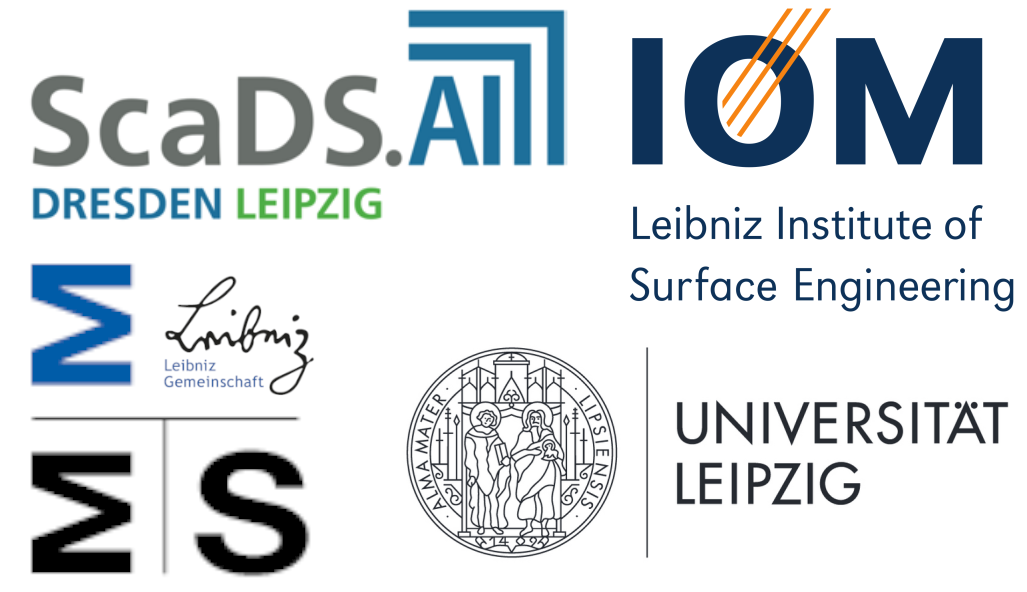Leibniz MMS AI School 2025#
This page contains training material of the AI School of the Leibniz Research Network Mathematical Modelling and Simulation (MMS) at the Leibniz Institute of Surface Engineering (IOM) in Leipzig. It was a joint event of the Leibniz Research Network MMS, Leipzig University with the Center of Scalable Data Analytics and Artificial Intelligence (ScaDS.AI) and the IOM.
Target audience#
The notebooks are written for scientists with basic knowledge of Python programming and are beginners in machine learning (ML) and artificial intelligence (AI). By the end of the training, active participants will have acquired fundamental knowledge in ML and AI. They will then know how to apply suitable ML/AI techniques to automatically process, analyze, and visualize data. The Jupyter notebooks and data sets of the course are available on GitHub (Link).
Trainer / Speaker#
Dr. Stefan Zahn (IOM)
Dr. Martin Rudolph (IOM)
Matthias Täschner (Leipzig University, ScaDS.AI)
Dr. Robert Haase (Leipzig University, ScaDS.AI)
Dr. Rodrigo Escobar Díaz Guerrero (IPHT)
Dr. Jamile Mohammad Jafari (IPHT)
Dr. Omid Shayestehpour (Paderborn University)
Program#
Monday:
12:00–13:00: Arrival of participants
13:00–14:00: Introduction round of instructors and participants
14:00–15:00: Introduction to the technical setup for the workshop and JupyterLab for all participants
15:00-15:15: Coffee break
15:15–18:00: Machine Learning Techniques: Regression
Tuesday:
09:00–11:00: Data Wrangling Part 1
11:00-11:15: Coffee break
11:15-12:00: Data Wrangling Part 2
12:00–12:50: Machine Learning Techniques: Classification
12:50-13:00: Group photo
13:00–14:00: Lunch break
14:00–16:00: Machine Learning Techniques: Clustering
19:00–22:00: Conference dinner (Shady, Körnerstraße 2)
Wednesday:
09:00–11:00: Deep Learning
11:00-11:15: Coffee break
11:15–13:00: Data Visualization in a JupyterLab Environment
13:00–14:00: Lunch break
15:00–17:00: City tour (meeting point: Mendebrunnen on Augustusplatz)
Thursday:
09:00–11:00: Language Models
11:00-11:15: Coffee break
11:15–13:00: Breakout sessions on specialized topics
13:00–14:00: Lunch Break
14:00–16:00: Breakout sessions on specialized topics
16:00-16:15: Coffee break
16:15–18:00: Breakout sessions on specialized topics
From 19:00: Visit to the Festival of Lights in Leipzig commemorating the peaceful revolution of 1989 (meeting point: Mendebrunnen on Augustusplatz)
Covered Python libraries#
bia-bob: AI-assisted Code Generation
dask: Python library for parallel and distributed computing
numpy: Basic numeric operations and processing for Python
pandas: Python data analysis and manipulation
plotly: Python plotting library for interactive visualizations
pytorch: Comprehensive deep learning framework
scikit-image: Scientific Image Processing
scikit-learn: Comprehensive Machine Learning Library (CPU-only, no deep learning)
scipy: Fundamental algorithms for scientific computing in Python
seaborn: Statistical data visualization
stackview: An interactive nD image viewer for Jupyter Notebooks
tensorflow with keras: High level deep learning frameworks
zarr: Python library for reading and writing Zarr groups and arrays
Acknowledgements#
We reused materials
about data visualization originally made by Marie-Sophie von Braun and Jan Ewald (ScaDS.AI, Uni Leipzig) shared and from Marcelo Zoccoler and Mara Lampert (TU Dresen), licensed under CC-BY 4.0.
We acknowledge the financial support by the Federal Ministry of Education and Research of Germany and by Sächsische Staatsministerium für Wissenschaft, Kultur und Tourismus in the programme Center of Excellence for AI-research „Center for Scalable Data Analytics and Artificial Intelligence Dresden/Leipzig“, project identification number: ScaDS.AI
